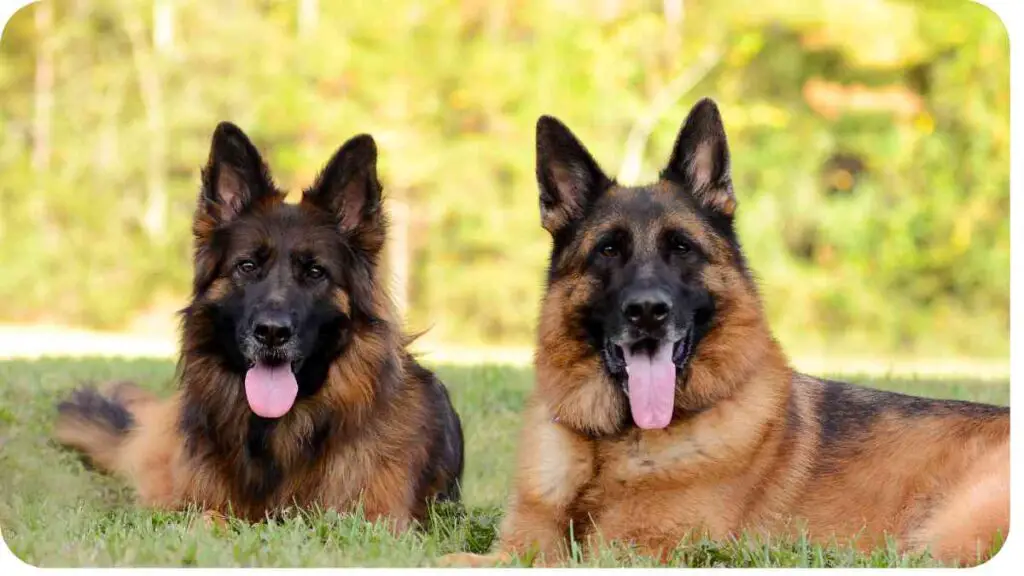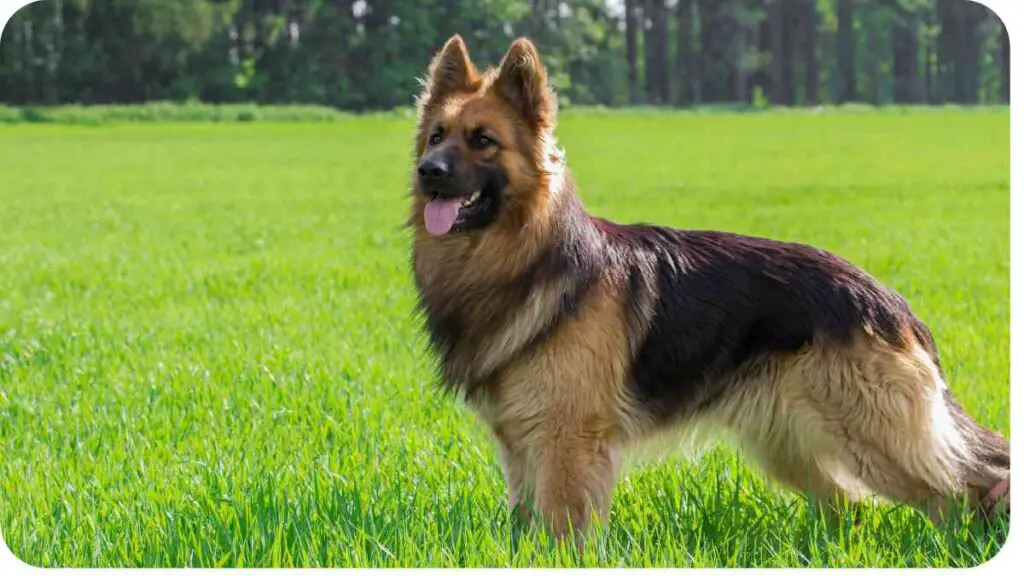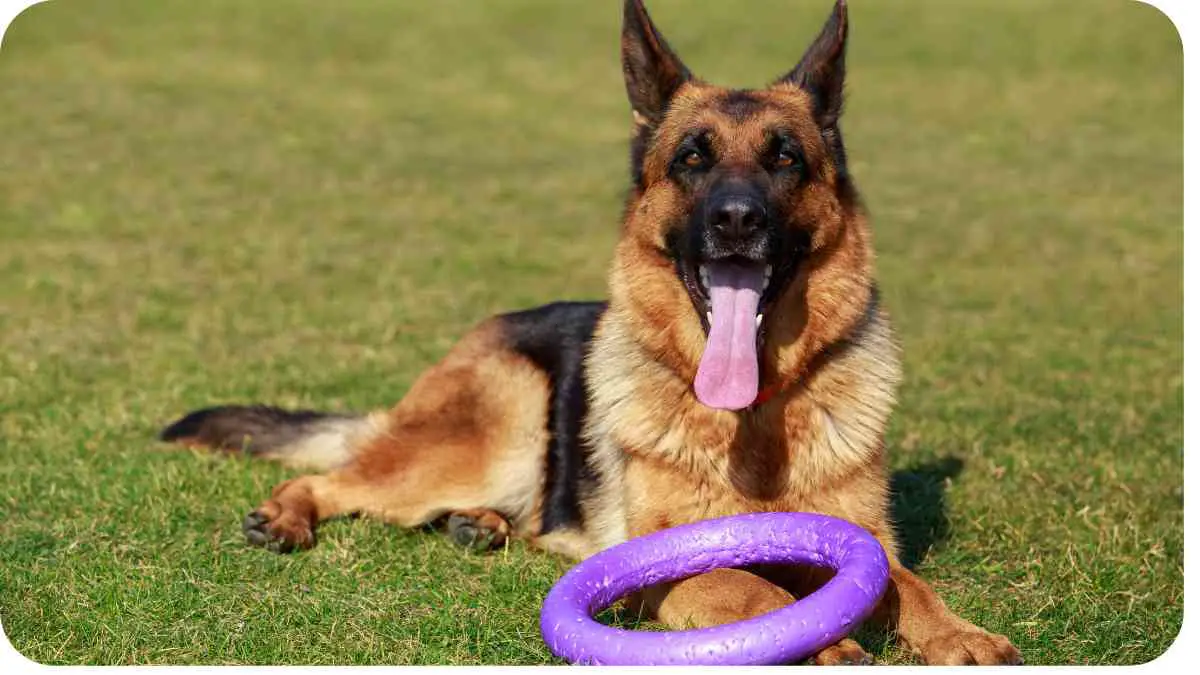When you welcome a German Shepherd into your family, their coat becomes a significant aspect of their appearance and overall health. Understanding how fast their hair grows is crucial for maintaining their coat’s health and appearance.
In this article, we delve into the intricacies of German Shepherd hair growth, factors affecting it, and tips for fostering optimal growth.
| Takeaways |
|---|
| 1. German Shepherd hair grows at a moderate pace. |
| 2. Factors like genetics and health influence growth rate. |
| 3. Regular grooming and a balanced diet support healthy hair growth. |
| 4. Consult a veterinarian for advice on grooming and shaving. |
| 5. Pay attention to signs of underlying medical conditions affecting hair growth. |
2. Understanding German Shepherd Hair Growth

German Shepherds possess a double coat consisting of a dense undercoat and a longer, coarser outer coat. The undercoat serves as insulation, keeping them warm in cold weather, while the outer coat protects against moisture and dirt. Both layers undergo periodic shedding and regrowth cycles.
Understanding the growth stages of a German Shepherd is crucial for proper care throughout their life. From puppyhood to adulthood, each phase brings unique needs and milestones, shaping their development
| Coat Type | Characteristics |
|---|---|
| Outer Coat | Longer, coarser hairs |
| Undercoat | Dense, softer hairs |
3. Factors Affecting German Shepherd Hair Growth
Several factors influence the rate at which a German Shepherd’s hair grows, including genetics, age, diet, health, and environmental conditions. Genetics play a significant role, determining coat type, color, and growth patterns.
| Factor | Impact |
|---|---|
| Genetics | Determines coat type and growth rate. |
| Age | Puppies experience rapid growth, including hair growth. |
| Diet & Nutrition | Proper nutrition supports healthy hair growth. |
| Health | Medical conditions can affect hair growth. |
| Environment | Climate and living conditions impact shedding and coat health. |
4. Typical Growth Rate of German Shepherd Hair
German Shepherd hair typically grows at a moderate pace, with variations depending on individual factors. On average, their hair grows approximately 1 to 1.5 inches per month.
Noise sensitivity in German Shepherds can greatly impact their well-being and behavior. Discover the sounds they dislike to create a comfortable environment and strengthen your bond with these intelligent and sensitive companions.
| Age Range | Average Growth Rate |
|---|---|
| Puppy (up to 6 months) | Rapid growth, including hair growth. |
| Adult (6 months onward) | Moderate growth rate. |
5. Tips for Promoting Healthy Hair Growth in German Shepherds

Maintaining a healthy diet rich in essential nutrients is key to supporting optimal hair growth in German Shepherds. Additionally, regular grooming, proper hydration, and a stress-free environment contribute to overall coat health.
| Tip | Description |
|---|---|
| Balanced Diet | Provides essential nutrients for hair growth. |
| Regular Grooming | Removes dead hair and stimulates hair follicles. |
| Hydration | Ensures proper moisture for healthy hair. |
| Stress Management | Reduces cortisol levels, which can impact hair growth. |
6. Common Hair Growth Problems in German Shepherds
Despite their robust nature, German Shepherds may encounter various hair growth issues. These can range from mild shedding to more serious conditions like alopecia or coat disorders.
Observing your German Shepherd’s ear movements can provide insights into their mood and health. Explore the reasons behind their ear flapping behavior to ensure their well-being and happiness as a beloved member of your family.
| Problem | Description |
|---|---|
| Excessive Shedding | Normal seasonal shedding or underlying health issues can lead to excessive hair loss. |
| Alopecia | Hair loss resulting from genetics, hormonal imbalances, or immune system disorders. |
| Skin Infections | Bacterial or fungal infections can hinder hair growth and cause hair loss. |
| Allergies | Allergic reactions to food, parasites, or environmental factors may affect hair growth. |
7. Grooming Practices to Support Healthy Hair Growth
Regular grooming is essential for German Shepherds to maintain a healthy coat and promote optimal hair growth. Brushing, bathing, and trimming help remove dead hair, distribute natural oils, and stimulate hair follicles.
| Grooming Practice | Frequency |
|---|---|
| Brushing | Daily to weekly, depending on shedding. |
| Bathing | Monthly or as needed to keep the coat clean. |
| Trimming | Quarterly or as needed to manage coat length. |
8. Diet and Nutrition for Optimal Hair Growth
A balanced diet rich in protein, vitamins, and minerals is crucial for promoting healthy hair growth in German Shepherds. High-quality commercial dog food or a balanced homemade diet supplemented with essential nutrients can support coat health.
| Nutrient | Role in Hair Growth |
|---|---|
| Protein | Essential for building and repairing hair follicles. |
| Omega-3 Fatty Acids | Support a healthy coat and reduce inflammation. |
| Vitamins (A, E, B) | Promote hair follicle health and growth. |
| Minerals (Zinc) | Supports hair follicle function and growth. |
9. Supplements for Enhancing Hair Growth
In addition to a nutritious diet, certain supplements can aid in promoting hair growth and maintaining coat health in German Shepherds. Consultation with a veterinarian is recommended before introducing supplements.
The lifespan of a German Shepherd is influenced by various factors, including genetics and lifestyle. Learn about the average duration of their companionship and how you can promote longevity and vitality in your loyal canine friend.
| Supplement | Benefits |
|---|---|
| Fish Oil | Rich in omega-3 fatty acids, supports coat health. |
| Biotin | Promotes healthy hair, skin, and nails. |
| Zinc | Supports hair follicle function and growth. |
| Vitamin E | Antioxidant properties promote skin and coat health. |
10. Managing Shedding in German Shepherds
German Shepherds are known for their seasonal shedding, which occurs twice a year as they transition between winter and summer coats. Regular grooming and a nutritious diet can help manage shedding, along with techniques such as deshedding tools and supplements.
| Shedding Management | Tips |
|---|---|
| Regular Brushing | Helps remove loose hair and prevents matting. |
| Deshedding Tools | Tools like undercoat rakes can minimize shedding. |
| Nutritional Support | Balanced diet supports healthy coat turnover. |
| Professional Grooming | Regular grooming appointments can manage shedding. |
11. Addressing Medical Conditions Affecting Hair Growth

Sometimes, hair growth issues in German Shepherds can stem from underlying medical conditions. It’s essential to recognize the signs and symptoms of these conditions and seek veterinary care promptly.
Discovering how long German Shepherds live requires a comprehensive understanding of their health and needs. Explore the factors influencing their life expectancy and ways to enhance their quality of life for many years of companionship.
| Condition | Symptoms |
|---|---|
| Hypothyroidism | Hair loss, weight gain, lethargy. |
| Cushing’s Disease | Hair loss, increased thirst, urination, and appetite. |
| Allergies | Itching, redness, hair loss, and skin infections. |
| Hormonal Imbalances | Changes in coat texture, hair loss, and skin issues. |
12. Conclusion
Understanding the intricacies of German Shepherd hair growth is vital for maintaining their coat health and overall well-being. By considering factors such as genetics, nutrition, grooming, and potential medical issues, you can support optimal hair growth in your furry companion.
Remember to provide a balanced diet, regular grooming, and consult a veterinarian if you notice any concerning changes in your dog’s coat. With proper care and attention, your German Shepherd can maintain a healthy, lustrous coat for years to come.
In conclusion, nurturing healthy hair growth in German Shepherds requires a holistic approach that addresses various factors influencing coat health. By incorporating proper nutrition, grooming practices, and veterinary care, you can ensure your furry friend’s coat remains vibrant and resilient.
Further Reading
- GermanShepherds.com – How Quickly Does Fur Grow Back?
Explore this forum thread to learn more about the rate at which a German Shepherd’s fur grows back after grooming or shaving. - Pedigree Database – How Long for Shaved GSD Hair to Grow Back
Discover insights into the duration it takes for a shaved German Shepherd’s hair to regrow by reading this community discussion. - PawSafe – How Long Does Shaved Dog Hair Grow Back
Visit this blog post to understand the process and timeline of shaved dog hair regrowth, including considerations for German Shepherds.
FAQs
How quickly does German Shepherd hair grow back after shaving?
German Shepherd hair typically grows back at a moderate pace, with noticeable regrowth within a few weeks to a couple of months, depending on factors like genetics and grooming practices.
Will shaving a German Shepherd’s coat affect its texture or quality?
Shaving a German Shepherd’s coat may alter its texture and quality, as it disrupts the natural growth pattern and may lead to irregular regrowth or changes in the undercoat.
Can I speed up the regrowth process of a shaved German Shepherd’s hair?
While you cannot drastically accelerate the regrowth process, maintaining a healthy diet, regular grooming, and providing proper care can support optimal hair regrowth in German Shepherds.
Are there any risks associated with shaving a German Shepherd’s coat?
Shaving a German Shepherd’s coat can expose their skin to sunburn, insect bites, and temperature extremes. Additionally, it may disrupt their natural insulation and increase susceptibility to skin issues.
Should I consult a veterinarian before shaving my German Shepherd?
Yes, consulting a veterinarian is recommended before shaving a German Shepherd, as they can provide guidance on whether shaving is necessary and offer advice on proper grooming techniques and aftercare.

I’m Dr. Hellen James, I’ve spent my career working with dogs, and I’ve seen first-hand how important it is to understand the individual needs of each breed. I want to share my knowledge of dog breeds with you so that you can make informed decisions about which dog will be best for your household and lifestyle.

